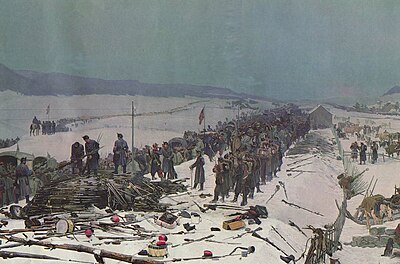1891 Nobleman Insurrection: Difference between revisions
No edit summary |
No edit summary |
||
| Line 1: | Line 1: | ||
{{WIP}} | |||
{{Infobox military conflict | {{Infobox military conflict | ||
| conflict = 1891 Nobleman Insurrection | | conflict = 1891 Nobleman Insurrection | ||
Revision as of 09:57, 12 July 2024
This article is incomplete because it is pending further input from participants, or it is a work-in-progress by one author. Please comment on this article's talk page to share your input, comments and questions. Note: To contribute to this article, you may need to seek help from the author(s) of this page. |
| 1891 Nobleman Insurrection | |||||||||
|---|---|---|---|---|---|---|---|---|---|
 Disarmament of Forelis Insurrectionists after their surrender in late 1891 | |||||||||
| |||||||||
| Imperial Government-Nobleman Insurrectionists | |||||||||
|
| (Noble Insurrectionist Revolt) | ||||||||
| Commanders and leaders | |||||||||
|
| ||||||||
The 1891 Nobleman Insurrection, or often reflected upon negatively as the "2nd Nobleman Rancor," was a short-lived unsuccessful military revolt lead by Count Ortwin Baldo Braune and several other higher-ranked secessionist Nobleman Dynasties (predominantly in the north) against the Imperial Government in Reichsstadt. On February 12th, 1891, Count Braune lead several other realms within the Forelis Province in declaring their secession from the Empire and founding a new independent nation; on that same day, the combined armies of Count Braune and his allies launched surprise attacks on all Imperial facilities and garrisons within their reach. Count Braune dispatched hundreds of letters beginning at the start of the month directly addressing the Emperor along with hundreds of other Nobleman Families. Each letter contained a series of declarations that would later go on to be known as the "Letters of Declarations." In the Letters, Count Braune would go on to proclaim himself King of his domain and declare its secession and independence from the Empire; that he and his allies hereby declare the founding of the "Neuenried Confederation" and encourage other noble realms to join their new nation; and declared that the new Neuenried Confederation will promptly and without delay "emancipate the Empire their forefathers built from the hands of filth who've irrevocably perverted Imperial Authority and Noble Rule."
In an attempt to assassinate the Emperor and send a clear message, Count Braune's letter to Emperor Charles I supposedly contained an unknown poison. Believed to be the recently synthesized poison Ricin, the Emperor's Secretary was the first to open and read the letter, almost immediately becoming violently ill after flipping through the documents. Several others within the Palace who responded to the Secretary's call for help also fell ill due to the rumored white powder found in the envelope. The envelope never reached the Emperor and the staff who responded to the calls for help were treated - the Emperor's Secretary was less fortunate and died. Before destroying the contents for decontamination, a handwritten note was supposedly discovered with only one sentence written on it: "Ich hoffe Du verreckst, Schmore in der Hölle!" Translated to English the message means, "I hope you died, Burn in Hell."
Prelude
At its core, the central conflict leading to the 1891 Noble Insurrection were the disputes held by a faction of Noblemen which argued that Imperial Authorities had been eroding the legitimate rule of Noble Dynasties stemming as far back as 1450, decades prior to the 1502 Nobility Civil War or "1st Nobleman Rancor". Nobleman then and now argued that Imperial Authorities, namely the Emperors of the time, had begun unfairly burdening the Noble Class while also removing privileges enjoyed by their forefathers for generations.
